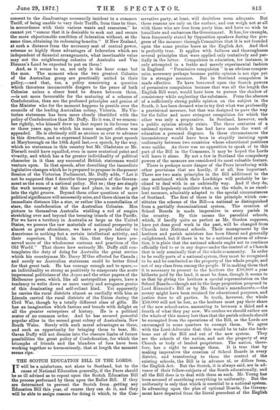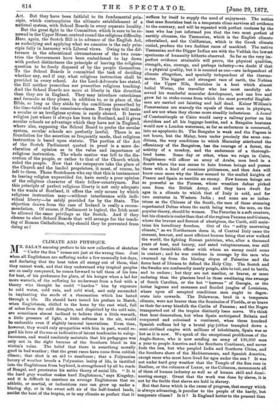THE SCOTCH EDUCATION BILL IN THE LORDS.
IT will be a misfortune, not alone to Scotland, but to the cause of National Education generally, if the Peers should be so ill advised as to repeat upon the Scotch Education Bill the process performed by them upon the Ballot Bill. If they are determined to prevent the Scotch from . getting any Education Bill this year, of course they can do it, and they will be able to assign reasons for doing it which, to the Con-
servative party, at least, will doubtless seem adequate. But these reasons are only on the surface, and can weigh not at all with those who are free from party bias, and have no wish to humiliate and embarrass the Government. It has, for example, been frequently stated by Opposition speakers during the pro- gresa of the measure through Committee that it is not founded upon the same precise bases as the English Act. And that is perfectly true. It applies with fullness and thoroughness several principles that were applied only tentatively and par- tially in the latter. Compulsion in education, for instance, is only attempted in a feeble and merely experimental fashion in England. "Permissive compulsion" is an obvious compro- mise, necessary perhaps because public opinion is not ripe yet for a stronger measure. But in Scotland compulsion is made effective. To have bestowed upon the Scotch powers of permissive compulsion because that was all the length the English Bill went, would have been to pursue the shadow of consistency while neglecting the substance. From the absence of a sufficiently strong public opinion on the subject in the South, it has been deemed wise to try first what was professedly a provisional measure, but that was designed to pave the way for the fuller and more stringent compulsion for which the other was only a preparative. In Scotland, however, such a public opinion already exists. The three centuries of a national system which it has had have made the want of education a personal disgrace. In these circumstances the inconsistency would have been in stupidly insisting upon uniformity between two countries whose educational positions were unlike. As there was no opposition to speak of to this part of the Bill in the Commons, it may be hoped the Lords will leave it alone. By not a few in Scotland the compulsory powers of the measure are considered its most valuable feature. There is perhaps more danger of the Peers interfering With other provisions that are hardly, if at all, less important. There are two main principles in the Bill additional to the one mentioned which their Lordships will probably be in- clined to deal with in an unfriendly way. And if they do, they will hopelessly mutilate what, on the whole, is an excel- lent measure, admirably adapted to the special circumstances of Scotland. The first of these is the principle which con- stitutes the scheme of the Bill—a national as distinguished from a partially denominational system. The creation of School Boards is made imperative in every parish in
the country. By this means the parochial schools, which, if hardly quite so perfect as Mr. Gordon supposes, have yet done good work in the past, will be changed from Church into National schools. Their management by the heritors and parish ministers has been liberal and generally enlightened, but if there is to be a national system of educa- tion, it is plain that the national schools ought not to continue officially tied to or in any degree under the control of a Church that is only nominally that of the whole community. In order to be really parts of a national system, they must be recognised to be and be conducted as the property of the whole people, and not of any class from among the people. If in making them that it is necessary to present to the heritors the 150,000 a year hitherto paid by the land, it must be done, though it seems to us that by giving the heritors a special representation on the School Boards—though not in the large proportion proposed in Lord Kinnaird's Bill or by Mr. Gordon's amendments,—the money might have been retained for educational purposes, and justice done to all parties. In truth, however, the whole 150,000 will not be lost, as the heritors must pay their share of the new school-rates, amounting to between a third and a fourth of what they pay now. We confess we should rather see the whole of this money lost than that the parish schools should be exempted from the operations of the Bill, as the Lords are encouraged in some quarters to exempt them. We agree with the Lord-Advocate that this would be to take the back- bone out of the Bill and out of the new system. They are the schools of the nation, and not the property of any Church or body of landed proprietors. The nation, there- fore, has a right to manage them. It is true that by making imperative the creation of School Boards in every district, and transferring to them the control of the existing schools, the Bill is in advance of, or differs from, the English Act. But the Scotch, it is always said, are in ad- vance of their fellow-subjects of the South educationally, and all the Bill does is to deal with them as such. Mr. Young has been accused of sacrificing everything to uniformity. But the uniformity is only that which is essential to a national system. In advancing upon the plan of optional Boards, the Govern- ment have departed from the literal precedent of the English
Act. But they have been faithful to its fundamental prin- ciple, which contemplates the ultimate establishment of a national system, with School Boards in every separate locality.
But the great fight in the Committee, which is sure to be re- newed in the Upper House, centred round the religious difficulty. Here, again, the Scotch Bill is in advance of the English Act, as embodying and applying what we conceive is the only prin- ciple frilly in harmony with Liberal views. Owing to the dif- ference in the educational circumstances of the two coun- tries the Government have been emboldened to lay down with perfect distinctness the principle of leaving the religious question to be freely disposed of by the people themselves. To the School Boards is committed the task of deciding whether any, and if any, what religious instruction shall be provided in every school. As the Lord-Advocate has stated, the Bill neither prescribes nor proscribes religious teaching. And the School Boards are more at liberty in this direction than they are in England. They may introduce catechisms and formuloe as they please. in addition to, or in place of, the Bible, so long as they abide by the conditions prescribed by the time-table and the conscience-clause. To say this will make a secular or an irreligious system is surely absurd. It leaves religion just where it always has been in Scotland, and it gives secular schools no advantage which they have not in England, where also, supposing the School Board to prefer the secular system, secular schools are perfectly lawful. There is no foundation for the assertion so frequently made, that religious instruction is based upon statute. The portion of the Act of the Scotch Parliament quoted in proof is a mere de- claration of opinion as to the value and importance of religious instruction. The whole matter was left to the dis- cretion of the people, or rather to that of the Church which ruled the people. Now that the ratepayers take the place of the Church and the landed proprietors, it must, of course, be left to them. Those Scotchmen who say that this is tantamount to leaving religion unprovided for, have surely a poor opinion of the religious character of their fellow-countrymen. But this principle of perfect religious liberty is not only adequate to the wants of Scotland, it offers the only means by which religious instruction may—without interference with indi- vidual liberty—be safely provided for by the State. The objection drawn from the case of Ireland is really a recom- mendation. Of course, if Parliament is logical, the Irish must be allowed the same privilege as the Scotch. And if they choose to elect School Boards that will arrange for the teach- ing of Roman Catholicism, why should they be prevented from doing so ?



































 Previous page
Previous page